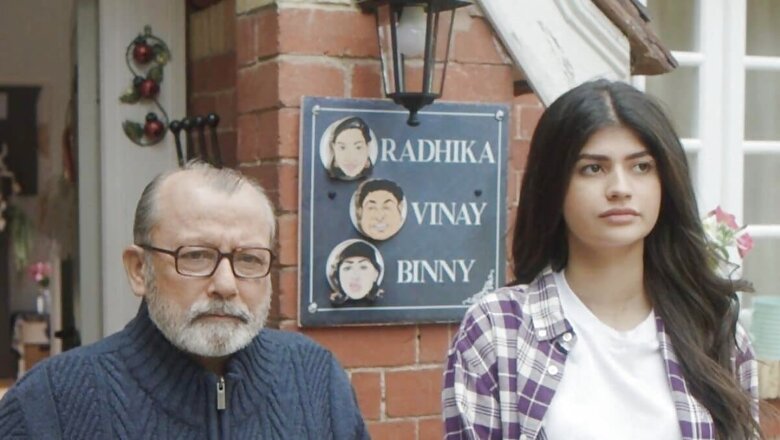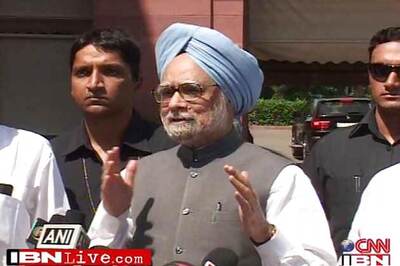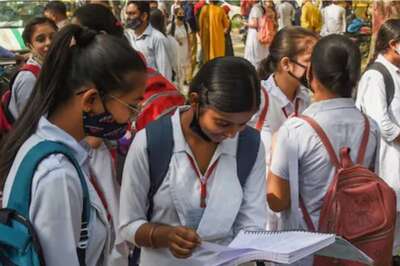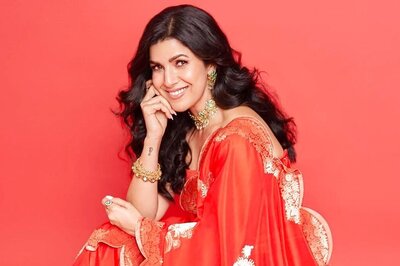
views
Binny And Family Movie Review: Binny And Family sees the makers thanking the who’s who of the film industry in its opening credits, which, needless to say, is a healthy sight reiterating how Bollywood is one big, happy family. From Vikrant Massey to his toddler son Vardaan, everyone seems to have come together to support this family drama. But does that mean the film is a flawless portrayal of flawed family dynamics?
The bond between a grandparent and grandchild is precious. Despite a wide generation gap, there’s a beautiful thread woven with empathy, love, warmth, and care that ties them together. Attempting to explore the nuances of this priceless relationship is Binny And Family, which marks the acting debut of Anjini, a third-generation Dhawan. Ssanjay Tripaathi’s directorial is like a pastel-colored gift box tied with a cute ribbon bow. But what lies within can disappoint you. On paper, the film has all the ingredients to be a heartwarming, tear-jerking relationship drama, but its laidback writing becomes its weakest link.
As the title suggests, Binny And Family revolves around a teenager named Binny who lives in London with her parents. Her father is originally from Bettiah, a small town in Bihar, and his parents—Binny’s grandparents—still reside there. Every year, they pay a two-month visit to London. This annual visit freaks Binny and even her mother out, as it means changing their lifestyle to accommodate her grandparents. We come to know that she, along with her parents, moved to the UK five years ago. Currently, she’s in the twelfth grade and heads the dramatics society at her school.
Like most teenagers, she’s a party animal. She spends some nights partying and drinking with her best friend, another Gujarati NRI obsessed with high-end fashion brands and social media. As usual, her grandparents decide to visit her. Once they leave, she sighs in relief. But back in Bettiah, her grandmother falls severely ill. When they decide to fly to London for her treatment, Binny opposes it vehemently, stating that their presence interferes with her life and freedom.
She leaves the house at night after her father reprimands her for her behavior, only to learn that her grandmother has passed away. She returns to India to pay her last respects and is struck by guilt, believing that her refusal to allow her grandmother to come to London cost her life. Had she let her come for better treatment, she might still be alive. Driven by guilt, Binny forges a bond with her grandfather, who starts staying with Binny and her parents after his spouse’s death. After some fits and starts, they get along well, until a predictable anticlimax strikes.
Binny And Family takes a one-line plot and stretches it into a 2-hour-20-minute film, which, truth be told, turns into an excruciatingly long and endless affair. The film introduces far too many subplots that don’t contribute to the core narrative. Case in point: Binny’s grandfather being a beacon of hope for the retired population in his town, and Binny’s infatuation with her classmate, Dhruv. The film clings to far too many tropes, but they add no depth or substance to the plot. Binny is portrayed as an angry, moody, rebellious, and nonchalant teenager, which might resonate with many people her age, but it comes off as excessive and unnecessary at times.
Teenage pangs are something we can all relate to, but Binny’s character leaves little room for empathy. It feels like a forced attempt to justify the upheavals in her life and interpersonal relationships. Early on, we witness an argument between her and her parents where her father complains that she casually throws around the F-word and addictively listens to rap music, emphasizing the generational and communication gap between them. He also mentions that they belong to a middle-class family, yet this piece of information is never highlighted throughout the narrative. Their habits and lifestyle never bear testament to this claim.
The director indulges too much in establishing Binny’s background, and almost the entire first half is spent doing so. The film only picks up in the second half, but by then, it’s too late. While the post-interval portion is better than the first, it’s overloaded with events, leaving you waiting for the rusty ride to end. The makers also try too hard to make it a sappy affair, which comes across as a little too contrived. Despite its heartwarming theme, you’ll barely find yourself getting emotional.
The evolution of Binny’s relationship with her grandfather is drawn out over too many sequences, which, honestly, weren’t necessary, as the point is made early on. The soap-opera-like treatment further slows down the pace. Long, didactic speeches about “loving your grandparents” turn the film into a damp squib. The makers also attempt to touch upon themes like cultural displacement and the bittersweet complexities of a father-son relationship, but they never dive deeply enough to impact the narrative compellingly.
Despite the numerous writing flaws, Anjini delivers a brilliant performance for her debut. She’s confident and possesses stunning screen presence. In confrontational scenes, she gives her all, and in others, she strikes a fine balance between bitterness and sweetness. She brims with potential, and it will be interesting to see what she does next. Pankaj Kapur, as her grandfather, is perfectly cast for the part, and Rajesh Kumar also excels. Their emotional scenes are filled with warmth and restraint and are beautifully portrayed.
Himani Shivpuri deserves a mention as the avuncular grandmother. Charu Shankar, on the other hand, suffers from a poorly developed character, and in most scenes, she merely serves as an anchor for Rajesh, despite opposing him a few times. Binny And Family is a one-time watch. You might watch it for the love of your grandparents, but don’t expect it to leave you feeling like hugging them.


















Comments
0 comment